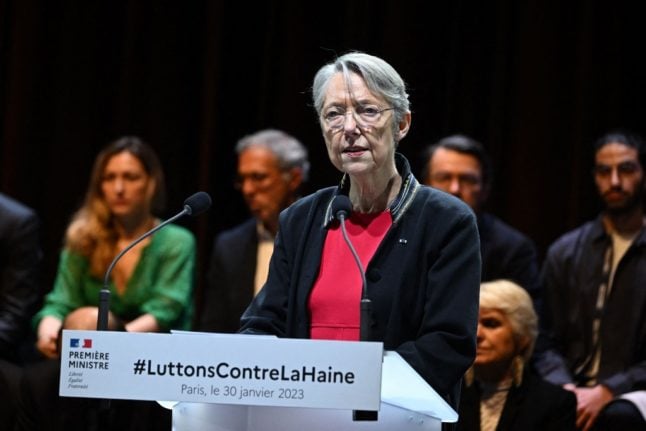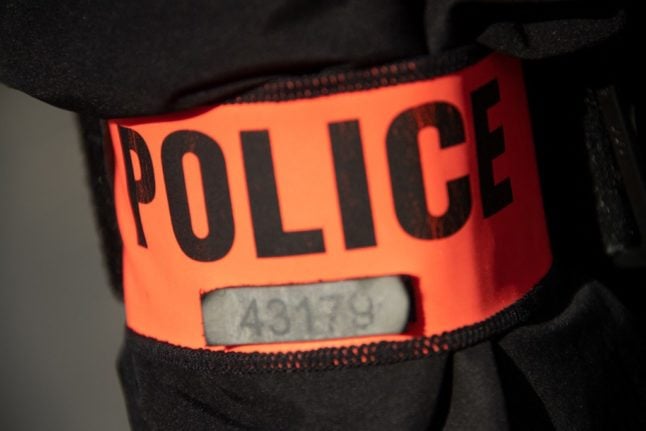French prime minister Elisabeth Borne presented the details of the government’s four-year plan to tackle racism, antisemitism and anti-Romani prejudice, which she and Minister for Gender Equality and Equal Opportunities, Isabelle Lonvis-Rome, produced together.
The plan contains over 80 measures that were decided upon by a team of 12 ministers, after consultation with at least 35 associations.
EN DIRECT I Présentation par la Première ministre @Elisabeth_Borne et les membres du @GouvernementFR du plan national de lutte contre le racisme, l’antisémitisme et les discriminations liées à l’origine. https://t.co/rmuoGYuNCV
— Gouvernement (@gouvernementFR) January 30, 2023
According to data from the French government, at least 1.2 million people suffer from discrimination of a racist or anti-Semitic nature each year in France.
The actions outlined will span from 2023 to 2026 and they focus on a few specific areas: better education to help fight against discrimination, stronger sanctions for perpetrators, and more tools to help those who have been victim of racist or anti-Semitic discrimination.
Education
The education and training component of the plan applies to both students and teachers. For pupils – the plan will require that each French student visit a historical or memorial site related to racism, antisemitism or anti-Romani prejudice at some point in their scholastic career. An example of this might be the Holocaust (Shoah) memorial in Paris.
READ MORE: OPINION: New education minister has already given a lesson in France’s race problem
The government will also facilitate more travelling exhibitions to provide greater access for students and schools in areas with few memorial sites. Additionally, the plan will encourage students to use the “Culture Pass” to visit such locations.
Public officials for their part will also begin learning about discrimination in France. Training seminars for all civil servants will be carried out in phases until 2026.
Borne also highlighted the importance of this instruction prior to the start of the 2024 Olympic and Paralympic Games. Every volunteer and “sports educator” who will participate in the Olympic games – particularly those who will come in contact with minors – will benefit from a dedicated training to help spot and avoid discrimination.
The plan also stipulates that French school teachers and staff should participate in mandatory training programmes every five years to help train them to better respond to situations of racism or discrimination.
Measuring discrimination
While the plan does not contain any measures related to the collection of statistics on race, the French government does hope to begin using blind tests to determine the level of racial discrimination involved in the hiring process.
According to reporting by Franceinfo, this may entail sending two identical CVs for the same job offer, while changing only the candidates “origins” (ethnic or racial background) to gauge discrimination levels.
READ MORE: France is ‘more tolerant than ever’, study into racism finds
In the press dossier published by the French government, this segment specifies that regular “testing” will be conducted for both the private and public sector, “according to methods developed alongside trade unions, employer’s organisations, and associations” with the hopes of reinforcing equal opportunities for candidates. These tests will reportedly help companies become more aware of how pervasive discrimination might be in their hiring practices.
According to Franceinfo, companies found to be complicit in discriminating against candidates based on their religious or racial background could face “naming and shaming” in addition to “criminal or financial sanctions” if they fail to respond sufficiently after being made aware of the problem.
Opinion surveys will also be conducted by the Ministries of the Interior and National Education, to determine how often citizens (of all ages) experience acts of discrimination, according to the plan.
Harsher penalties
The plan also aims to toughen penalties for those found guilty of racist or anti-Semitic offences. This will particularly apply to those in public office – from mayors to police officers and teachers, who will face harsher penalties if found guilty of a racist offence.
Helping victims
The government also hopes to allow people who have been victim of discrimination to file complaints with associations, rather than having to come to do so at a police station. This is intended to make the complaint system more anonymous and to “better protect victims”.
Reporting racist or discriminatory comments in Ubers, ride shares and taxis
Borne also said on Monday that the government hoped to create a single platform that all ride share and taxi users could use to report any type of racist or antisemitic discrimination experienced while taking a ride share or taxi.



 Please whitelist us to continue reading.
Please whitelist us to continue reading.
Member comments